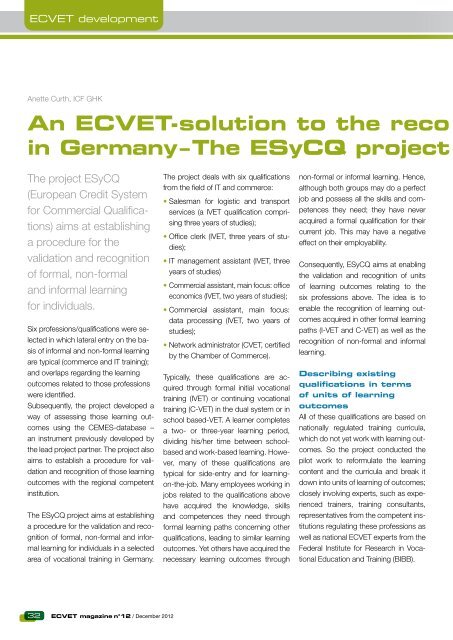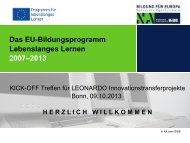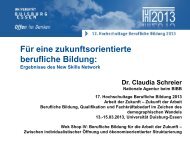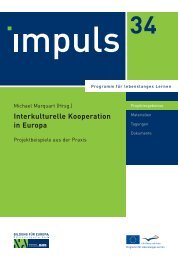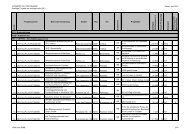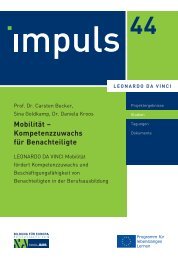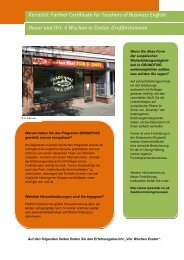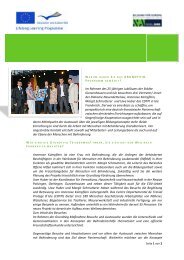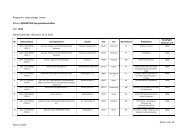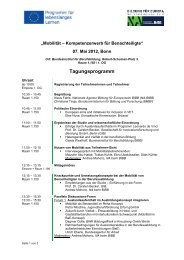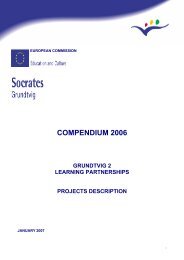Create successful ePaper yourself
Turn your PDF publications into a flip-book with our unique Google optimized e-Paper software.
ECVET development<br />
Anette Curth, ICF GHK<br />
An ECVET-solution to the reco<br />
in Germany – The ESyCQ project<br />
The project ESyCQ<br />
(European Credit System<br />
for Commercial Qualifications)<br />
aims at establishing<br />
a procedure for the<br />
validation and recognition<br />
of formal, non-formal<br />
and informal learning<br />
for individuals.<br />
Six professions/qualifications were selected<br />
in which lateral entry on the basis<br />
of informal and non-formal learning<br />
are typical (commerce and IT training);<br />
and overlaps regarding the learning<br />
outcomes related to those professions<br />
were identified.<br />
Subsequently, the project developed a<br />
way of assessing those learning outcomes<br />
using the CEMES-database –<br />
an instrument previously developed by<br />
the lead project partner. The project also<br />
aims to establish a procedure for validation<br />
and recognition of those learning<br />
outcomes with the regional competent<br />
institution.<br />
The ESyCQ project aims at establishing<br />
a procedure for the validation and recognition<br />
of formal, non-formal and informal<br />
learning for individuals in a selected<br />
area of vocational training in Germany.<br />
32 ECVET magazine n°12 / December 2012<br />
The project deals with six qualifications<br />
from the field of IT and commerce:<br />
• Salesman for logistic and transport<br />
services (a IVET qualification comprising<br />
three years of studies);<br />
• Office clerk (IVET, three years of studies);<br />
• IT management assistant (IVET, three<br />
years of studies)<br />
• Commercial assistant, main focus: office<br />
economics (IVET, two years of studies);<br />
• Commercial assistant, main focus:<br />
data processing (IVET, two years of<br />
studies);<br />
• Network administrator (CVET, certified<br />
by the Chamber of Commerce).<br />
Typically, these qualifications are acquired<br />
through formal initial vocational<br />
training (IVET) or continuing vocational<br />
training (C-VET) in the dual system or in<br />
school based-VET. A learner completes<br />
a two- or three-year learning period,<br />
dividing his/her time between schoolbased<br />
and work-based learning. However,<br />
many of these qualifications are<br />
typical for side-entry and for learningon-the-job.<br />
Many employees working in<br />
jobs related to the qualifications above<br />
have acquired the knowledge, skills<br />
and competences they need through<br />
formal learning paths concerning other<br />
qualifications, leading to similar learning<br />
outcomes. Yet others have acquired the<br />
necessary learning outcomes through<br />
non-formal or informal learning. Hence,<br />
although both groups may do a perfect<br />
job and possess all the skills and competences<br />
they need; they have never<br />
acquired a formal qualification for their<br />
current job. This may have a negative<br />
effect on their employability.<br />
Consequently, ESyCQ aims at enabling<br />
the validation and recognition of units<br />
of learning outcomes relating to the<br />
six professions above. The idea is to<br />
enable the recognition of learning outcomes<br />
acquired in other formal learning<br />
paths (I-VET and C-VET) as well as the<br />
recognition of non-formal and informal<br />
learning.<br />
Describing existing<br />
qualifications in terms<br />
of units of learning<br />
outcomes<br />
All of these qualifications are based on<br />
nationally regulated training curricula,<br />
which do not yet work with learning outcomes.<br />
So the project conducted the<br />
pilot work to reformulate the learning<br />
content and the curricula and break it<br />
down into units of learning of outcomes;<br />
closely involving experts, such as experienced<br />
trainers, training consultants,<br />
representatives from the competent institutions<br />
regulating these professions as<br />
well as national ECVET experts from the<br />
Federal Institute for Research in Vocational<br />
Education and Training (BIBB).


